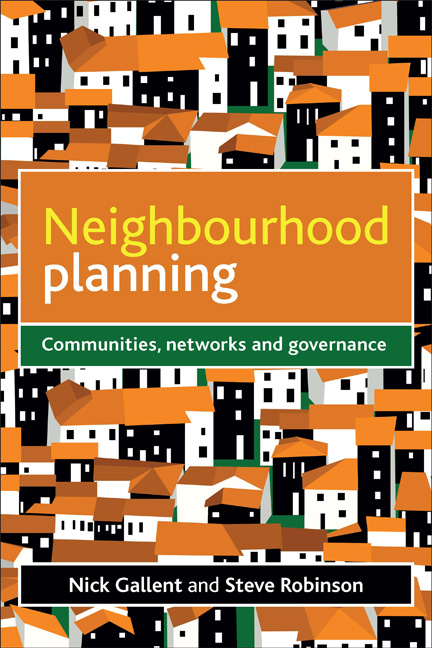Book contents
- Frontmatter
- Dedication
- Contents
- List of figures, images and table
- Abbreviations
- Acknowledgements
- Authors’ note
- Part One Democracy, planning and localism
- Part Two Capacity building and community-based planning
- Part Three The interface with policy actors
- Part Four Neighbourhood planning, leadership and democratic renewal
- References
- Index
eight - Capacity building and outreach
Published online by Cambridge University Press: 07 September 2022
- Frontmatter
- Dedication
- Contents
- List of figures, images and table
- Abbreviations
- Acknowledgements
- Authors’ note
- Part One Democracy, planning and localism
- Part Two Capacity building and community-based planning
- Part Three The interface with policy actors
- Part Four Neighbourhood planning, leadership and democratic renewal
- References
- Index
Summary
The degree to which parish councils authentically relay local views and local aspiration has been a key debate for those concerned with community governance issues for a number of years. Parish councils are frequently ridiculed as elitist, out of touch and parochial bodies that lack any real connection to the communities they serve (see Mitchell, 1951; Clark et al, 2007). They have even been called ‘feudal’, dominated by land and property-owning cliques (Raco, 2007). A question therefore remains as to the extent to which parish councils are either shut off from broader communities or are genuine vehicles for wider participation, and a focal point for building capacity and reaching out to different interests and to their neighbours. This chapter continues the theme of community dynamics, but begins to look at wider communication, within and beyond the immediate neighbourhood. It examines capacity building through the extension of networks: how communities establish lines of communication, how they build alliances and how alliances are maintained. A critical concern, emerging in the last chapter, is whether parish councils – potential hubs for community-based planning – are isolated from wider communities and broader interests, by virtue of how they organise themselves and the priorities they set, or whether they are an authentic focus and outlet for much wider, inclusive, neighbourhood planning processes.
Parish councils: ‘communicative’ and coordinating neighbourhood hubs?
A reasonable place to start this analysis is at what might be called the ‘engagement protocols’ of the parish councils: whether electoral mandate and consultation allowed them simply to get on with the task of planning, or whether they sought a more intimate, continual dialogue with local interests and residents. In the Ashford communities, some parish councils distributed regular ‘updates’ on the progress being made on the parish plan. Following initial consultation on a ‘wish-list’ of plan content (distributed to all residents), they took the view that they had a ‘mandate to just to get on with it’. In this respect, they mimicked the behaviour of the Borough Council. Other groups, however, engaged in a more systematic dialogue with the wider community.
- Type
- Chapter
- Information
- Neighbourhood PlanningCommunities, Networks and Governance, pp. 95 - 106Publisher: Bristol University PressPrint publication year: 2012



